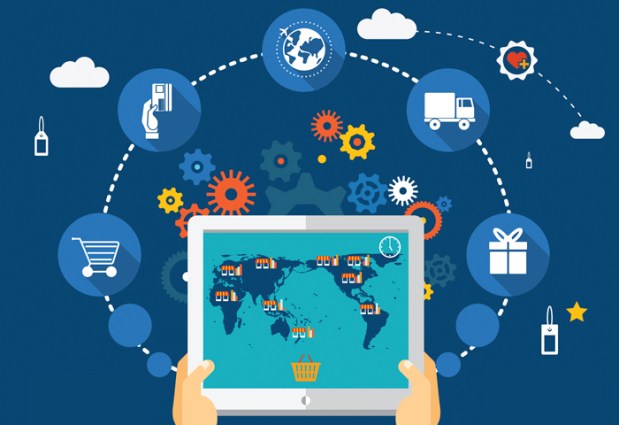The SME ‘Minefield’ Of Cross-Border Payments

It’s a classic saying in the insurance industry: The time to sign up for an insurance policy is not when something goes wrong. Unfortunately, according to trade credit insurance firm Euler Hermes, one-third of small- and medium-sized exporters based in the U.S. have experienced a nonpayment issue in the last year, and many of those SMEs are left high-and-dry in the AR department without a way to collect the bill.
The findings are outlined in Euler Hermes’ latest research on the issue of SME exporters struggling to get paid in today’s economy. Analysts at the firm found that a significant portion of businesses surveyed are interested in launching international sales efforts, but nearly 40 percent of SMEs already exporting said that their overseas buyers pose higher risks than their domestic ones.
PYMNTS wanted to know more about why cross-border trade is causing cash flow problems for U.S. companies, so we talked about the new research with Euler Hermes President and CEO of North American operations James Daly.
According to Daly, there is far from a straightforward answer as to why foreign corporate buyers are higher risk for SME exporters.
“The exporter may not be conducting due diligence and research before dispatching the order,” Daly offered. “Sometimes the sale is more tempting than the potential risk.”
[bctt tweet=”Sometimes the sale is more tempting than the potential risk”]
He noted that for smaller businesses in particular, it can be more difficult to obtain the necessary information about a foreign customer – it could be available in a foreign language, for example, if it can be accessed at all, he said.
“There could also be a dispute between what the buyer thought it was getting and what the exporter thought it was asking for,” Daly continued. “A small business might have trouble managing that if they don’t have a mechanism to make a recovery or understand the complex legal systems of another country.”
Plus, the executive added, crime and fraud can also trip up small businesses working in an unfamiliar market. Then, there are the issues of customs, import papers and documentation, import taxes that corporate buyers decide they don’t want to pay, or a shipment may never arrive where it’s supposed to.
These issues are faced by all corporations dealing abroad, but exacerbated by the fact that SMEs have more limited resources at their disposal to mitigate these risks.
That’s despite the fact that today, there are dozens of innovations and services (like AP automation and e-invoicing) aimed at helping businesses large and small streamline their accounts receivables operations, digitize their billing, and speed up payments overall.
“While these technologies are sophisticated,” Daly said, “many U.S. SMEs are not yet, and can’t afford the upfront investment necessary to implement such a system. …The technologies are often most useful for larger corporates.”
For example, while financial institutions the world over have been investing in startups and innovators that want to implement blockchain technology to facilitate cross-border payments and heighten security of international transactions, Daly said the industry isn’t quite there to truly make an impact for SME exporters.
“We believe blockchain technology is interesting, and it has great future potential as a tool that export companies can use to build trust when dealing with new markets and buyers,” he stated. “At the moment, blockchain technology is very expensive and will need to be regulated before it can be used on a mainstream basis.”
Further, overseas buyers may not want to adapt whatever technology a U.S. company wants to use, meaning any ability to invest in high-tech AR tools can be quickly rendered useless.
While smaller exporters struggle to overcome late- and non-payments, Daly also pointed to the challenges they face when understanding why a non-payment occurs in the first place. Foreign exchange difficulties may be what first comes to mind when considering the obstacles of cross-border trade, but according to the Euler Hermes executive, that isn’t the biggest pain point.
“A lot of trade is done in USD, which mitigate the majority of currency risk for U.S. companies,” Daly explained, adding that currency risk, though small, can still challenge SMEs more than it does with larger corporations.
But there are bigger hurdles to overcome, Daly said.
“The key reason why overseas buyers would demand longer payment terms is because they are further away,” he noted. “It takes longer to get the goods, so the sales cycle and supply chain are both extended.” Daly added that launching sales efforts in a new jurisdiction also requires time for a business to be adopted by that overseas market, further adding risk and time to the process.
[bctt tweet=”Overseas buyers demand longer payment terms because they are further away”]
As provider of trade credit insurance, Euler Hermes naturally believes that these products can be most effective at protecting SMEs when their international deals go south. The often more affordable trade credit insurance option, Daly said, means businesses can protect their transactions, plus offer open terms for their overseas buyers. Open terms reduce non-payment risk, he explained, adding that, according to the World Trade Organization, overseas companies are likely to procure 40 percent more when they are offered open terms.
According to Daly, the “biggest issue” in smaller U.S. exporters going global is that they do so without credit protection. And for SMEs, these businesses are often too small for letters of credit issued by a bank, he added, leaving many companies to figure out these issues solo.
“The overall situation is a minefield that SMEs don’t have the infrastructure to navigate,” Daly said.
